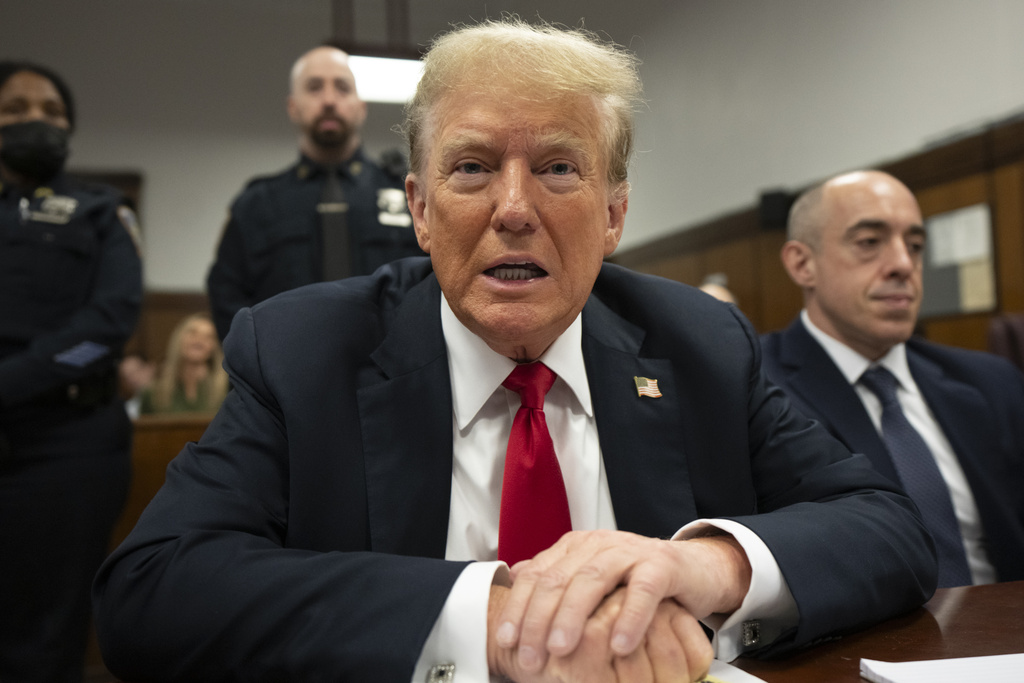Trump Can Most Likely Still Vote in Florida Even as a Convicted Felon. Here’s Why.

Steven Hirsch/New York Post via AP
Former President Donald Trump is now a convicted felon. That most likely won’t stop him from being able to legally vote for himself in Florida in November, as multiple legal commentators have pointed out, due to provisions in Florida and New York law.
The ex-president was facing 34 felony counts for falsifying business records regarding alleged hush money payments to cover up extramarital affairs before the 2016 election. It was a historic first-ever criminal trial of a former U.S. president, and now historic first-ever criminal conviction of a former U.S. president, after the jury verdict — guilty on all 34 counts — was announced on Thursday.
Trump is scheduled to be sentenced on July 11. His guilty convictions are all for falsifying business records, a class E felony under New York law.
Florida has a well-deserved reputation for being one of the tougher states for felons to regain their voting rights, and the state does revoke voting rights for out-of-state felony convictions.
According to the Florida Department of State’s website, for felonies other than murder or sexual offenses, “[a] felony conviction in another state makes a person ineligible to vote in Florida only if the conviction would make the person ineligible to vote in the state where the person was convicted.” Trump’s conviction is in New York, and New York law says that felons cannot vote while they are incarcerated, but does restore the right to vote upon release, even if they are on parole or other post-release probationary supervision.
As to the question of whether or not Trump will be sentenced to imprisonment, there are multiple factors for New York Supreme Court Justice Juan Merchan to consider. According to a detailed analysis of the potential sentence by Just Security, Merchan “will have discretion in imposing a sentence, taking into account the seriousness of the conduct on which Trump is convicted, the evidence at trial, Trump’s testimony, and other factors,” and that sentence could include some period of incarceration:
Falsifying records in the first degree is a class E felony, punishable by a maximum of four years in prison and a $5,000 fine. Class E felonies generally carry indeterminate sentences, meaning that the court is authorized to impose a sentence within a certain range. For indeterminate sentences, the court often imposes a minimum and a maximum, with the minimum representing the amount of time the defendant must serve before being eligible for parole. For Class E felonies, the lowest sentencing range is one to three years, and the highest range is 1 ⅓ to four years. However, for defendants with limited or no criminal history such as Trump, there is no minimum sentence. A court can impose an alternative sentence of a fixed term of less than one year of incarceration, based upon the nature of the crime and the defendant’s “history and character.”
This is Trump’s first criminal conviction, but it’s not the only blemish on his record that the court can consider, including his multiple violations of the gag order imposed by Merchan that already got him a stern warning from the judge that additional violations could land him behind bars. In that ruling, Merchan expressed his reluctance to incarcerate a former and potential future president, but did expressly state that he was in fact willing to do so in order to “protect the dignity of the judicial system and compel respect.”
Here, where Trump was found guilty of 34 separate counts in a broad-ranging scheme to influence the results of a presidential election — remember this was all occurring in the wake of the explosive Access Hollywood tape and another sex scandal at that moment may very well have been a determinative factor — Merchan may be more likely to view the stakes as high enough that incarceration is warranted. Trump did not testify but his words out of court may come back to bite him. His frequent attacks on Merchan and his daughter, both directly and through his claque of Republican acolytes, will not help his cause; neither will his lack of remorse and unrelenting claims that the trial was “rigged.”
There is precedent for incarceration for this crime, even for a first-time offender. CNN legal analyst and Just Security contributor Norm Eisen has pointed out that judges have imposed incarceration about 55 times for this offense. The Just Security analysis cited above mentions several of these cases, including that of former Trump CFO Allen Weisselberg, who “received a five-month jail sentence and five months’ probation for pleading guilty to all 15 counts, including four falsifying records counts, although the other charges included other serious offenses such as grand larceny, offering a false document for filing and scheme to defraud.”
If Merchan does sentence Trump to some time behind bars, an appeal would preserve the ex-president’s voting rights. Kathleen R. McGrath, spokesperson for the New York State Board of Elections, told PolitiFact that the state does not take away voting rights from convicted felons whose jail sentences are stayed pending appeal.
Palm Beach State Attorney Dave Aronberg, the chief prosecutor for Trump’s home county, pointed out Florida legal precedent that states that a felony conviction “does not become final until the judgment of the lower court has been finally affirmed by the appellate court,” meaning that the felon “is not ‘convicted’ within the meaning of the constitutional disqualification from voting while an appeal from such conviction is pending or while the time for an appeal from the judgment or sentence has not expired.”
Trump has, unsurprisingly, vowed to appeal. Loyola Law School Professor Justin Leavitt wrote at Election Law Blog that he expected this “vigorous appellate process” would take “many months at minimum,” so even if Merchan did sentence Trump to incarceration, the November election date is expected to arrive before his Florida voting rights will be affected.
Even in the unlikely event the wheels of justice turn swiftly enough to reach an appellate verdict before November, Trump would still have another opportunity to restore his voting rights by appealing to the Florida Clemency Board, which is comprised the Florida governor and cabinet members.
Gov. Ron DeSantis, Attorney General Ashley Moody, Chief Financial Officer Jimmy Patronis, and Agriculture Commissioner Wilton Simpson are all Republicans and each of them have openly expressed contempt for the verdict, meaning that it’s likely Trump would find a receptive audience with that board.
Patronis even went so far as to declare “Trump should be granted clemency immediately” in a tweet on Thursday, leaving zero doubt as to his views on the matter.
—




